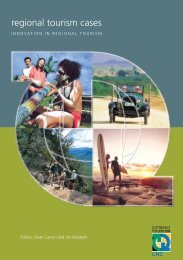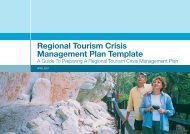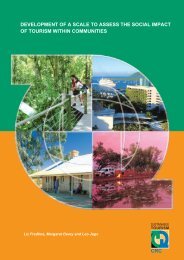Tourism Risk Management - Sustainable Tourism Online
Tourism Risk Management - Sustainable Tourism Online
Tourism Risk Management - Sustainable Tourism Online
Create successful ePaper yourself
Turn your PDF publications into a flip-book with our unique Google optimized e-Paper software.
CHAPTER 3: NATIONAL RESPONSIBILITIES FOR RISK AND DISASTER<br />
MANAGEMENT<br />
Aim of this Chapter<br />
The aim of this chapter is to examine the responsibilities of national governments in risk and disaster<br />
management, and to identify the structures and frameworks within which tourism operators and<br />
destinations can develop their own capacity to prepare for, respond to, and recover from, crises and<br />
disasters.<br />
<strong>Risk</strong> <strong>Management</strong> at the National Level<br />
In general terms, national governments are responsible for the development, coordination and<br />
implementation of policies relating to risk and disaster management. National governments establish<br />
strategic directions for risk and disaster management processes and, in most countries, provide the<br />
funding for related activities. Strategies are developed by the responsible government departments<br />
hosting multi-agency committees with representation from all key stakeholders.<br />
As a significant global industry, tourism is a significant contributor to the economy of most countries,<br />
but it plays a key economic role in developing countries where it can provide the primary source of<br />
foreign exchange and be a major driver of economic development. As the world’s largest nongovernment<br />
economic sector, tourism is particularly vulnerable to the impact of disasters.<br />
As outlined in Chapter 1, the tourism industry needs to draw to the attention of national governments<br />
the legislative, regulatory, and social environment in which tourism operates, the possible threats to<br />
its continued activity from actual or threatened disasters, and the subsequent effects upon a national<br />
economy of any downturn in tourism activities.<br />
Coordination and Partnerships – A National <strong>Tourism</strong> Council<br />
The World <strong>Tourism</strong> Organization (UNWTO) is a specialized agency of the United Nations. With a<br />
current membership of 150 countries, seven territories and over 300 Affiliate Members representing<br />
the private sector, educational institutions, tourism associations and local tourism authorities, the<br />
UNWTO provides a global forum for tourism policy issues. UNWTO recommends that countries<br />
‘develop a national policy on tourism safety commensurate with the prevention of visitor risks’, and<br />
form national tourism councils with executive committees responsible for risk management in key<br />
areas, according to the needs of each destination. Mixed-sector councils comprising government and<br />
industry participants are essential since many of the necessary actions can and should be<br />
implemented by the private sector. A key committee of a national tourism council would be a national<br />
safety and security committee, responsible for developing and coordinating measures to protect the<br />
tourism industry and its clients at each destination. Government agencies and tourism industry<br />
sectors which should be included on a safety and security committee are:<br />
• National tourism administration/Visitor Board;<br />
• Police;<br />
• Counter-terrorism/security agencies;<br />
• Immigration Department;<br />
• Attorney-General’s Department;<br />
• Customs;<br />
36 <strong>Tourism</strong> <strong>Risk</strong> <strong>Management</strong> – An Authoritative Guide to Managing Crises in <strong>Tourism</strong>
















